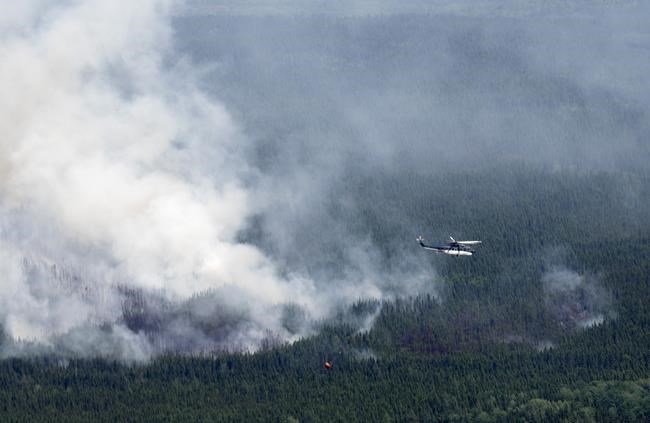OTTAWA — Canada's record-breaking wildfire season will continue to be abnormally intense throughout July and into August, Natural Resources Canada projected Thursday, posing a greater threat to the safety and health of communities across the country.
The wildfire season has been unusually severe this year, breaking historical records on the amount of land burned and affecting communities that are unaccustomed to dealing with the flames and smoke.
"The risk of forest fires is going to remain very high," Michael Norton, director general with the Canadian Forestry Service, said at a briefing Thursday.
Atlantic provinces and eastern Quebec are expected to see more normal conditions in August, but other parts of the country can expect the severity forecast to be well above average, projections show.
The forecasts are based on anticipated high temperatures, dry conditions and historical comparisons, Norton said.
The flames have threatened critical infrastructure and forced evacuations while the prolonged exposure to smoke has created potentially dangerous conditions, particularly for people with pre-existing health concerns.
The months of intense fires spread out between British Columbia and the Atlantic provinces has also stretched Canada's firefighting capacity, and the government has called in 3,258 international firefighters to help over the course of the season.
Despite the ongoing challenge, Norton said the government is confident they'll be able to sustain the number of firefighters needed until the flames die down.
Canada surpassed the known historic record for total area burned by wildfires in one season on June 27, with months of hot weather still to come.
The number of fires has more than doubled since that month, from 323 active fires at the beginning of June to 656 this week.
Some 88,000 square kilometres have burned as of July 5. Put together the burned land is be larger than the size of Lake Superior, and nearly 11 times the average amount burned by that date over the past 10 years.
More Canadians have been evacuated from their homes this year than in the last four decades, with more than 155,000 forced to leave due to fire and smoke.
Earlier in the season, the majority of fires were thought to have been caused by human activity, but since June 1 almost three in four fires are confirmed to have been started by lightning.
Emergency Preparedness Minister Bill Blair said he expected this season would be difficult when it began months earlier than typically anticipated, calling the weather projections at that time "sobering and concerning."
Long and intense fire seasons have become more common in Canada, however, and the minister said climate change is to blame.
"I would not want to suggest that this is the new normal," he said at an online press conference Thursday.
"Given the difficult conditions, the concerning conditions that persist right across many parts of the country, I think it's very important that Canadians be aware of their risk, that they take the steps that are necessary to prepare."
The risk isn't only to communities threatened by nearby fires, but also from the smoke that can travel great distances and settle over communities for days at a time.
The smoke can be particularly dangerous for people with heart and lung conditions, and Health Canada recommends people stay indoors in well-ventilated areas when the air quality is poor.
For most people, though, overheating can be worse than breathing smoke, said chief public health officer Dr. Theresa Tam.
"If you did not have air conditioning and it's too warm to stay inside with the windows closed, seek out a local cooling or clean air space," she advised.
"If you must spend time outside, consider using a well-fitted respirator type mask, like an N95, to reduce exposure to the fine particles from wildfire smoke."
Provincial and federal governments haven't tallied up the costs associated with this fire season yet, but expect the final figure will be considerable, given the record-breaking conditions.
"I believe the cost of this one will be as high as this event has been extreme in its impact across the country," Blair said.
This report by The Canadian Press was first published July 6, 2023.
— With files from Mia Rabson.
Laura Osman, The Canadian Press
